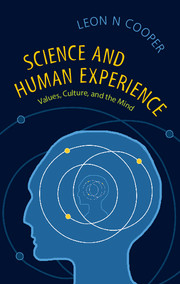Book contents
- Frontmatter
- Dedication
- Contents
- Preface
- Acknowledgement
- Part One Science and Society
- 1 Science and Human Experience: (Mephistopheles Is Alive and Well and Living in the Space Age)
- 2 Does Science Undermine our Values?
- 3 Can Science Serve Mankind?
- 4 Modern Science and Contemporary Discomfort: Metaphor and Reality
- 5 Faith and Science
- 6 Art and Science
- 7 Fraud in Science
- 8 Why Study Science? The Keys to the Cathedral
- 9 Is Evolution a Theory? A Modest Proposal
- 10 The Silence of the Second
- 11 Introduction to Copenhagen
- 12 The Unpaid Debt
- Part Two Thought and Consciousness
- Part Three On the Nature and Limits of Science
- References
10 - The Silence of the Second
from Part One - Science and Society
Published online by Cambridge University Press: 05 November 2014
- Frontmatter
- Dedication
- Contents
- Preface
- Acknowledgement
- Part One Science and Society
- 1 Science and Human Experience: (Mephistopheles Is Alive and Well and Living in the Space Age)
- 2 Does Science Undermine our Values?
- 3 Can Science Serve Mankind?
- 4 Modern Science and Contemporary Discomfort: Metaphor and Reality
- 5 Faith and Science
- 6 Art and Science
- 7 Fraud in Science
- 8 Why Study Science? The Keys to the Cathedral
- 9 Is Evolution a Theory? A Modest Proposal
- 10 The Silence of the Second
- 11 Introduction to Copenhagen
- 12 The Unpaid Debt
- Part Two Thought and Consciousness
- Part Three On the Nature and Limits of Science
- References
Summary
The Second Amendment is silent on the issue of whether the right to keep and bear arms is absolute. Does it guarantee the right to carry loaded weapons into a kindergarten classroom?
In his famous parable, “The Silence of the Sirens,” Franz Kafka tells us that the sirens have a still more fatal weapon than their song, namely their silence. “It is conceivable,” he says, “that someone might possibly have escaped from their singing; but from their silence certainly never.”
That more fatal weapon, silence, is, perhaps, the key to the continuing ambiguity in the interpretation of the Second Amendment.
If the founders had wanted to guarantee “the right of the people to keep and bear Arms” they could have done so in a completely transparent manner: “Congress shall make no laws that infringe on the right of the people to keep and bear arms.” They did not. Why not? Why did they remain silent on so important an issue?
What they did say was: “A well regulated Militia, being necessary to the security of a free State, the right of the people to keep and bear Arms, shall not be infringed.”
The most natural and unstrained interpretation of this statement is that it concerns the necessity for a “well regulated” militia (a pressing issue at the time) and forbids the government from disarming the militia.
- Type
- Chapter
- Information
- Science and Human ExperienceValues, Culture, and the Mind, pp. 73 - 75Publisher: Cambridge University PressPrint publication year: 2014

